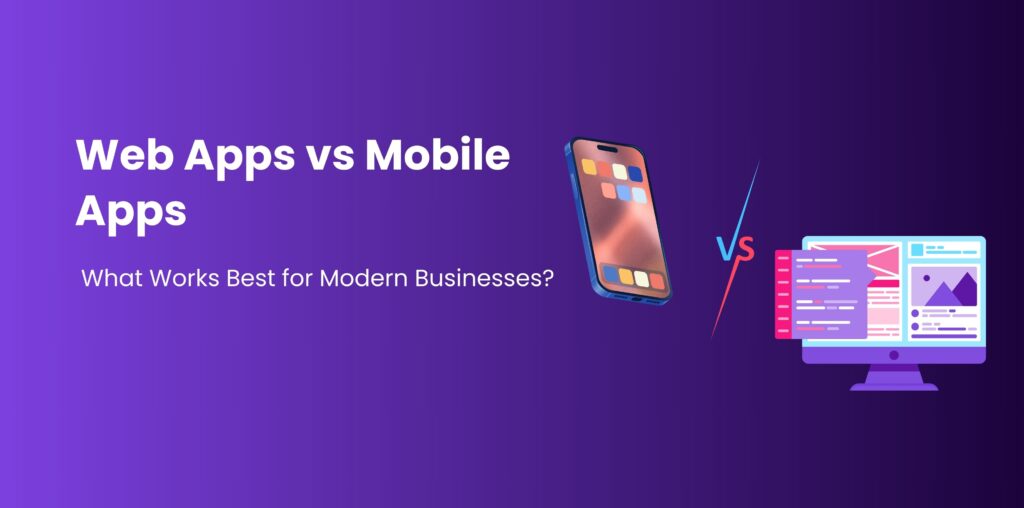In today’s fast-paced digital world, businesses face an important decision: should they invest in a web app or a mobile app? Both options have their merits, but the choice ultimately depends on your business goals, target audience, and functionality requirements.
While mobile apps are becoming increasingly popular, web apps are also gaining ground due to their accessibility and ease of updates. In this article, we’ll break down the key differences between web apps vs mobile apps, helping you determine which is the best fit for your business in 2025.
Understanding Web Apps and Mobile Apps
Before diving into the benefits and drawbacks of each, let’s first clarify the difference between web apps and mobile apps:
- Web Apps: These are applications that run in a web browser, often responsive to adapt to different screen sizes. Users access them via URLs and don’t need to install them on their devices.
- Mobile Apps: These are applications specifically designed to run on mobile devices (iOS, Android). Users download and install these apps from app stores like Google Play or the Apple App Store.
Now that we understand the basics, let’s explore the pros and cons of each option.
Benefits of Web Apps
1. Accessibility Across Devices
One of the biggest advantages of web applications is their accessibility. Users can access your web app on virtually any device with an internet connection—smartphones, tablets, laptops, and desktops. All they need is a browser.
This makes web apps ideal for businesses looking to reach a broader audience without the need to develop separate apps for Android and iOS.
2. Easy Maintenance and Updates
Updating a web app is simpler than updating a mobile app. You don’t need to worry about releasing updates to users manually or submitting them to app stores for approval. Once an update is made to the server, all users immediately access the latest version.
This low-maintenance advantage can be a big time-saver for businesses, especially if they have limited resources.
3. Lower Development Costs
Web application development services typically cost less than developing native mobile apps. Since you don’t need to build separate apps for multiple platforms (iOS and Android), you save time and money. Plus, web apps are easier to maintain long-term.
4. SEO and Discoverability
Web apps are discoverable through search engines, which means potential customers can find your app through Google or other search engines. This offers more organic traffic opportunities compared to mobile apps, which require users to find them on app stores.
Benefits of Mobile Apps
1. Better Performance and User Experience
Mobile apps provide faster performance and a more seamless user experience. Because they’re built specifically for the device, they can use the device’s hardware and software capabilities to run more efficiently. For example, mobile apps can operate offline and interact directly with the device’s camera, GPS, and other sensors.
For businesses where performance is key, such as in gaming, fitness, or real-time communication apps, mobile apps tend to offer a superior user experience.
2. Increased User Engagement with Push Notifications
One of the biggest advantages of mobile apps is the ability to send push notifications directly to users. This feature allows businesses to engage customers in real-time with personalized alerts, promotions, and updates. Push notifications help keep users engaged with the app, ultimately increasing retention rates.
3. Offline Functionality
Unlike web apps, mobile apps can work without an internet connection. This is essential for businesses offering services like navigation, media streaming, and offline access to content. Users can continue to engage with the app even when there’s no internet connectivity.
4. Access to Native Device Features
Mobile apps have direct access to device hardware such as the camera, GPS, microphone, and accelerometer. This allows businesses to create richer, more interactive experiences. For example, an iOS app development company can integrate advanced features like augmented reality (AR), facial recognition, and biometric authentication for enhanced security.
Web Apps vs Mobile Apps: Key Differences
Now that we’ve outlined the main benefits of each, let’s dive into the key differences between web apps vs mobile apps:
| Factor | Web App | Mobile App |
| Platform | Accessible via any device with a browser | Installed on a specific device (Android/iOS) |
| Performance | Limited by the browser, slower than mobile apps | Faster, optimized for mobile hardware |
| Offline Usage | Requires an internet connection | Can function offline |
| User Engagement | Limited engagement (no push notifications) | Real-time engagement via push notifications |
| Cost of Development | Lower (single codebase for all platforms) | Higher (separate development for each platform) |
| Updates | Instant updates for all users | Updates need to be downloaded and approved |
When Should You Choose Web Apps?
Web apps are the best option for businesses that want to:
- Reach a wide audience across different devices and platforms
- Keep maintenance costs low and streamline updates
- Offer a simplified user experience without heavy reliance on device features
- Improve SEO and organic discovery
Ideal Use Cases:
- Blogs and content websites
- SaaS platforms
- Simple business tools
- News and media outlets
When Should You Choose Mobile Apps?
Mobile apps are ideal for businesses that:
- Want to offer high-performance features that utilize the device’s hardware
- Need offline functionality or want to optimize user experience on mobile devices
- Seek higher user engagement with push notifications and personalized interactions
Ideal Use Cases:
- E-commerce platforms with advanced features (AR, payments, etc.)
- Fitness and health apps with real-time data and offline functionality
- Gaming and entertainment apps requiring high-performance capabilities
- Social networking apps with heavy user interaction
Web App vs Mobile App: The Right Choice for Your Business
The choice between web apps vs mobile apps ultimately depends on your business needs, goals, and target audience.
- If you need to build a broad-reaching, easy-to-update app, a web app might be the better choice.
- If you require high performance, deep user engagement, or offline functionality, a mobile app will likely be the right fit.
Need help deciding?
If you’re ready to build a web or mobile app for your business, partnering with the right web application development services India can guide you toward the best solution. Whether you choose a web app for its reach or a mobile app for its deep functionality, an experienced development company can ensure a smooth process from start to finish.




